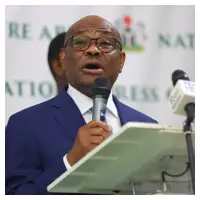Nigeria's mining sector has attracted over $800 million in foreign investments following reforms implemented under President Bola Tinubu's administration, according to Minister of Solid Minerals Development, Dr. Dele Alake.
Speaking during an interview for an upcoming State House documentary marking President Tinubu's second anniversary, Alake revealed that the sector generated over ₦38 billion in revenue in 2024, a significant increase from just ₦6 billion in the previous year. This achievement is particularly noteworthy as it was accomplished despite receiving only 18% of its ₦29 billion budgeted allocation.
"When we resumed, the entire sector generated ₦6 billion annually. By the end of 2024, we hit ₦38 billion. And this was with just 18% of our ₦29 billion budgetary allocation released. It shows how effective our policy framework has been," Alake stated.
The minister attributed this growth to the administration's new policy of local value addition and a tightened licensing regime. Under the new regulations, miners must establish clear plans for local processing plants before receiving operating licenses, effectively ending the practice of exporting raw minerals directly from extraction sites.
Major Investments in Processing Infrastructure
Several major projects are nearing completion as a result of these reforms. A $600 million lithium processing plant near the Kaduna-Niger border is scheduled for commissioning this quarter, while a $200 million lithium refinery on the outskirts of Abuja is in its final stages of development. Additionally, two processing plants in Nasarawa State are expected to be commissioned before the third quarter of 2025.
The first quarter of 2025 has already shown promising results, with the Mining Cadastral Office (MCO) and the Mines Inspectorate generating ₦6.9 billion and ₦7 billion in revenue, respectively. Alake projected that 2025 would be a record-breaking year for the sector.
Focus on Mineral Exploration
A key component of the current administration's strategy is increased investment in mineral exploration. The 2025 budget allocates ₦1 trillion for this purpose, aimed at generating internationally certified geological data to attract serious investors.
"Exploration is key. When we came in, Nigeria had spent just $2 million on exploration, compared to $40 million in Sierra Leone, $148 million in Côte d'Ivoire, and over $300 million in South Africa. No serious investor will touch your sector without credible data," Alake emphasized.
The minister's revelations highlight the Tinubu administration's commitment to diversifying Nigeria's economy beyond oil and gas, with the solid minerals sector emerging as a significant contributor to the nation's revenue and foreign investment portfolio.













